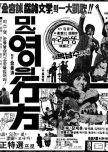
Cette critique peut contenir des spoilers
A film within a film that like a spider web tangle with reality
I didn't expect to see such a comedy from master of thrillers. I didn't read what genre it is and what it is about, apart from the fact that the time and place of the story is the Korean film industry in the 70s.I wouldn't call myself a professional of Korean cinema in the 70s, but from what I know, apart from the censorship and the governmental pressure on the studios, films didn't really look like Kim Jee-woon showed it. And he personally agreed with it, stating that he had drawn inspirations from the films of the Korean golden age: Kim Ki-young's "Housemaid" (1960) or Lee Man-hee's "The Devil's Stairway" (1964), as well as from classic Hollywood films like Hitchcock's "Psycho" (1960). The similiaities are very much visible, and there's nothing bad in it. Apart from the fact that all of those films are from the 60s. Moreover, he made the film in the film black and white, which was not common anymore in the 70s. But it was all for the sake of distinction of two stories, so I'll let it go.
Main character: director Kim Yeol (played by amazing Song Kang-ho) has just finished his new (first?) film called "Cobweb". However, right after the wrap he changes the script for something more radical and groundbreaking, something that - as he stated - had never been made in Korean cinema before. Not receiving the permission of the censors (which was very common in those times), and not really having much time for reshooting (as studios had to film a lot of films per year in order to receive licenses and permission for the future shootings, there was not enough staff and equipment etc.) he decided to do it all in secret in just two days. His decision led to chaotic events on the set, random people appearing, drinking, shouting, somewhere in the background some romance was born and died. But his maniacal determination for finishing his masterpiece led him to achieve what he eventually wanted. To change the rumours (which were not really just rumours, as we discovered at the end) about his creativness and being just an unexperienced assistant director of late director Shin Sang-ho (at first I thought I misheard it and thought they talked about Shin Sang-ok and was very much confused). In the end all ends well. The masterpiece which was "Cobweb" was shown in the cinema.
And the story of Kim Jee-woon's "Cobweb" is just like the Kim Yeol's "Cobweb", as he had been sued just before the cinema premiere. What had happened and why? Family of the director Kim Ki-young sued Kim Jee-woon stating that the main character was based on the late director. Song Kang-ho smoked pipe and wore thick-framed glasses just like Kim Ki-young used to. However, Kim Yeol was presented negativelly, as someone who stole someone else's work and had no real practice as a director - comparing him to Kim Ki-young, they were two totally different people. In the end, they found the agreement, but I am not surprised with the lawsuit.
Film's "Cobweb" was a melodrama about five characters whose fates crosses and tangled with each other just like spider's web. No matter how much they wanted to have a revenge and flee from the hopeless reality in which they stuck, they couldn't, eventually getting caught by the spider. The monster, who at first seem to be just a small prop in the film and eventually becoming the main character. Someone stated that spider and its web is like a revenge and hatred that people can't run away from and which destroy them from the inside. But then, would this film be so radical and groundbreaking as Kim Yeol wanted? Maybe the spider and its web was a metaphore for the harsh regime of Park Chung-hee in the 60s and 70s? Maybe it was a metaphore of wanting to be free as an artist and filmmaker, but being limited by the censorship and hopeless reality? In my opinion, it would make sense, given the fact that it's the 70s and filmmakers were doing films either commercially and politically correct, or were using incoherent metaphore to criticize the reality which they couldn't yet change or escape from. Or maybe it was just inspired from Kim Ki-young's horror films from the 70s (which I hadn't seen) and had no deeper meaning? I need to ask Kim Jee-woon, once I meet him one day.
Overall, I had a lot of fun watching this film and despite many things that didn't feel right for me (like the black and white parts of the film which were more from the 60s than 70s) I sincerely liked it. I really wish that Korean filmmakers would make more films like that than action-thrillers with the same plot, over and over again. Unfortunately, "Cobweb" did really poorly in the box office, so I doubt it :(
Cet avis était-il utile?

Where Is Miss Yeong?
0 personnes ont trouvé cette critique utile
Cette critique peut contenir des spoilers
A hostess film that starts promising and ends in disappointment
I found it interesting that I've seen "A girl who looks like the sun" (1975) by Lee Man-hee before seeing this one, and there's the same actress, dressed up in similar clothes, wearing the exact same necklace with heart and peace sign and it all happened in the same neighbourhood with low-rise flats. Yet the story is somehow different."Where is Miss Yang?" by Park Nam-su started as a teenage drama with two main characters: Miss Yang whose real name is Nan-hyang, and Jin-ho. Their roads crossed when both of them are caught by the police and became jail buddies . She was a girl who run away from home, he - a boy who took a break from studies in order to think about his future? His life? It was not rellly mentioned. Nevertheless, it was an interesting view on the teenages lives. People who are about to start an adult life, but are not yet ready to do so. They rebel towards the society that treats them like adults and towards parents who treats them like children. Both which they're not. It was such a fresh presentation of young adults who struggle with managing their daily life, but at the same time try to have fun and use their life as good as they can.
Unfortunately somewhere in the middle it all changed into a typical hostess film: a genre (?) from the 70s, where young woman, not having another option, in order to survive, decides to become a hostess girl (prostitute). Here, on one hand it also symbolized a continuation of rebelion towards her parents, because she wasn't from a poor family and didn't have to do it because of money. On the other, it fit into the common narration of hostess films where young woman is presented as a liberated woman who "doesn't have to, but want to do it". It all would fit greatly to contemporary narration about sex working and feminism, which I prefer not to get into. Here Nan-hyang is presented as a liberated woman, but because of her decision she received her bad ending at the end - which is common for classical hostess films, where division into good and bad is very clear. Moreover, it all ended just like it started: with her running on the street full of speeded cars. Maybe Park Nam-su wanted to show that life of rebeled teenagers is pointelss and would not lead enywhere, maybe he just wanted to make a hostess film, but decided to spice it up more with drama about rich teenagers? I don't know.
For me it looked like two different films. One is where Nan-hyang was a rebelled teenager, wandering and laughing around the city with Jin-ho, and the second one is where she out of blue decided to become a hostess and destroy her relationship with the man. It's also interesting because Jin-ho also changed a lot in the second part of the film: cutting his hair, offending "hippies" for being lazy etc. It really looks like their characters changed 180 degrees. I'm really curious how the censorship changed the original script, because for me it feels like the final version is just an enjoyable, but a failed monstrum of two different things.
It is definitely worth watching, especially for those who are interested in films from the 70s and those times in general, yet would like to watch something that is not really typical for them.
Cet avis était-il utile?




